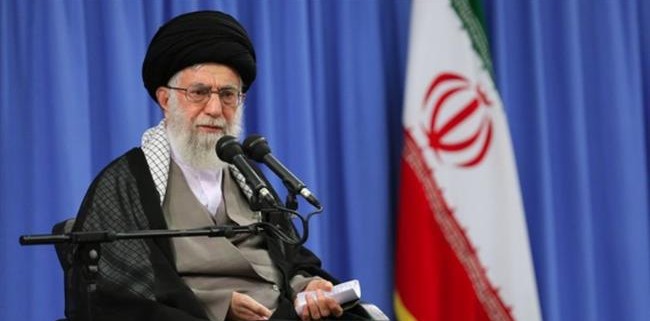PHOTO: Supreme Leader on Monday “Negotiations with US are lethal poison”
Extending his persistent condemnation of the US, Iran’s Supreme Leader said on Monday that Washington cannot be trusted over implementation of the July 2015 nuclear deal.
Ayatollah Khamenei has said repeatedly that the Islamic Republic can have no links with the US apart from the nuclear deal, but he went farther yesterday with his indication that the Joint Comprehensive Plan of Agreement might effectively be suspended.
The Supreme Leader told a gathering of invited Iranians in Tehran:
[The US is] calling for us to come negotiate on regional issues, but our experience with the JCPOA tells us that doing such a thing is a lethal poison. One cannot trust the Americans’ word on any issue.
Experience of U.S. violation of #JCPOA commitment proved that we cannot negotiate in any issue with U.S. as a reliable party. #IranDeal
— Khamenei.ir (@khamenei_ir) August 1, 2016
Khamenei then questioned the economic benefits of the nuclear agreement, implemented in January:
Weren’t the oppressive sanctions lifted so that the people would feel a change in their lives? Has there been a tangible effect on the people’s lives in the past six months?
The speech is a further caution to the Rouhani Government, which considers implementation of the nuclear deal an essential prerequisite for Iran’s economic recovery.
Soon after the announcement of implementation, Khamenei chastised President Rouhani for saying that the JCPOA would be followed by a “JCPOA 2” for trade and investment after years of US-led sanctions. In late March, the Supreme Leader warned that he would take over planning for his “Resistance Economy” of self-sufficiency if the Government showed weakness in its stance on the US.
Khamenei continued the pressure on Monday:
Today, even the diplomatic officials and those who were present in the negotiations reiterate the fact that the US is breaching its promises, and while speaking softly and sweetly, is busy obstructing and damaging Iran’s economic relations with other countries.
Implementation of the agreement was immediately complicated in January by a deliberate obscuring of its terms. While the Supreme Leader proclaimed that all sanctions would be lifted on “Day 1”, both Iran’s negotiators — including Foreign Minister Mohammad Javad Zarif — and those of the 5+1 Powers (US, Britain, China, Russia, France, and Germany) knew that the process would take months because of the complexity of the restrictions and US legislation.
While the European Union has lifted its strict sanctions imposed in July 2012, some US measures — including a bar on Iranian access to the American financial market — continue. Washington has also added Iranian individual and companies to its blacklist over Tehran’s ballistic missile testing, and the Supreme Court has frozen $2 billion in Iranian assets to allow families of victims of terrorism to sue for compensation.
European banks and companies have also been hesitant to renew business with Iran, in part because of fear of US punishment and in part because of complex discussions over the Islamic Republic’s regulations and financial system.
The situation is further complicated because of the wariness of Iran’s Revolutionary Guards, which has extensive holdings in the economy and key sectors such as energy, over the re-entry of foreign investors.

